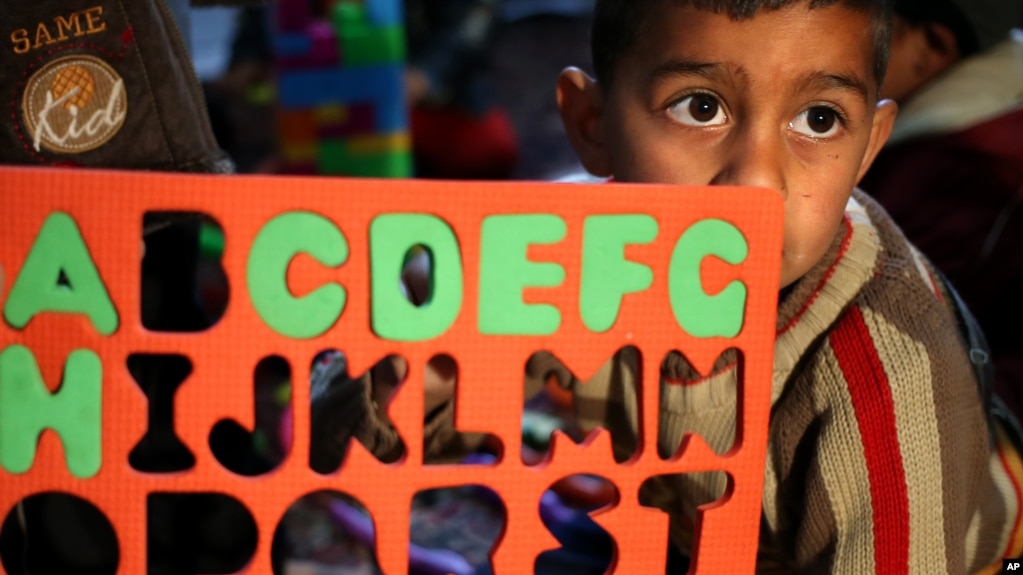
FILE – In this picture taken on Wednesday, March 12, 2014, a Syrian refugee boy Saleh el-Hussein, 5, looks on as he follows a lesson about the English alphabets. (AP Photo/Hussein Malla)
And now Words and Their Stories from VOA Learning English.
Today we talk about two expressions involving letters of the alphabet. They both warn us to be careful, and they sound similar. But their meanings are very different.
Here is the first one: to watch our p’s and q’s.
When we watch our p’s and q’s, we are on our best behavior. We are careful of our language too – so, no swearing. We do things politely and without causing trouble to others.
The expression is something an older person might say to children. “When you go to school, watch your p’s and q’s and mind your teachers.”
There are several stories about how the expression began.
Some word experts say it comes from people drinking in taverns or bars, places where alcohol is served. Bartenders would keep track of how much people drank by counting their pints (p’s) and quarts (q’s).
Other experts say the expression comes from the classroom. Schoolchildren were taught to be careful writing the letters “p” and “q,” which are easy to confuse.
And other experts say the phrase may come from the early days of the printing press. Letters were set in presses backwards so they would appear on the printed page correctly. P’s and q’s needed careful placement.
Now on to our second expression: to dot our i’s and cross our t’s.
To dot our i’s and cross our t’s also means to be very careful. But it means to be careful about procedures. We make sure we have followed directions correctly and have done everything the right way.
While it may have its roots in spelling correctly, we use this expression in many situations. For example, when the TikTok star read her contract with an advertising company, she was careful to dot her i’s and cross our t’s. She didn’t want anything to fall through the cracks. She didn’t want to overlook any small detail that may affect her business.
If you are making a deal or spoken agreement with someone, a friend might warn you to dot your i’s and cross your t’s. Be careful of the small details. It is common knowledge that the smallest details are often where mistakes are made.
So, that is why it is important to cross your i’s and dot your t’s.
Now, let’s hear two friends use these expressions
A: Are you sure you packed everything?
B: Yes, I’m sure. Please don’t ask me again!
A: Well, you usually forget something. Remember last time … at the airport?
B: Let’s not bring up THAT again. I won’t forget my passport this time.
A: I just wanted to make sure that we dot all our i’s and cross all our t’s. By being careful and thorough, we save time and money.
B: Don’t you ever get tired of being careful and thorough? Don’t you just want to be crazy and impulsive … for once in your life? Come on, throw away that list!
A: What are you doing? Give me my list back and behave! Seems like you not only have to dot your i’s and cross your t’s … you also need to watch your p’s and q’s!
And that’s all the time we have this Words and Their Stories. Until next time … I’m Anna Matteo.
Anna Matteo wrote this story for VOA Learning English.
________________________________________________________________
Words in This Story
swear –v. to use a commonly offensive word when you speak
politely –adv. to do something showing good behavior and respect for other people
printing press –n. a machine that prints books, newspapers, magazines, and similar materials in large numbers
procedure –n. a series of actions that are done in a certain way and in an established order to be acceptable
thorough –adj. careful about doing something in a correct way
impulsive –adj. doing things without careful though or planning
behave –v. to act in an acceptable or correct way